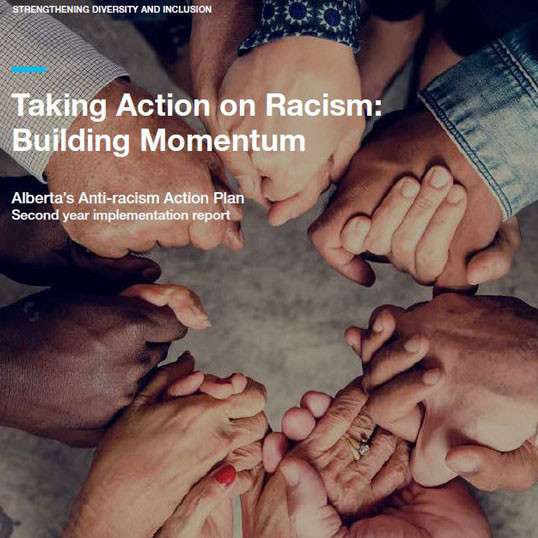Government mail service may be affected by the Canada Post labour disruption. Learn about how critical government mail will be handled.
Overview
Alberta’s government continues to take action to address racism and deepen efforts to honour Alberta's rich mosaic. Released in 2022, our Anti-Racism Action Plan was the first of its kind in Alberta. It outlined government's commitment to lead by sharing the value of diversity, removing systemic barriers to accessing government programs and services and ensuring Albertans have fair access to information, resources, services and opportunities.
In early 2025 we released a second year annual report, ‘Taking Action on Racism: Building Momentum,’ to highlight the expanding impact of our actions to ensure fair access to programs, services and opportunities for all Albertans.
Together, we will help more Albertans participate to their full potential in society and extend the many benefits that vibrant communities bring to our province.
I want to:
- Read Taking Action on Racism: Building Momentum
- Read Taking Action on Racism: A Year in Review
- Read Alberta's Anti-Racism Action Plan
- Learn about related grant programs
- Learn about the Alberta Black Advisory Council
- Learn about the Alberta Anti-Racism Advisory Council
Taking Action on Racism: Building Momentum
-

‘Taking Action on Racism: Building Momentum’ builds on existing and new initiatives to address racism and help ensure fair access to government programs, services and opportunities for all Albertans. This report is a continuation of the first-year implementation report.
It includes actions to support equitable housing for First Nations and Metis groups, grant funding programs to support Indigenous and racialized communities, infrastructural improvements to reduce hate and bias motivated crimes, and updates in elementary school curricula to incorporate age-appropriate learning on anti-racism.
Addressing racism is a complex process, and our government continues to deepen efforts to promote and foster respect and belonging for all Albertans, regardless of cultural background or origin. We've implemented 27 of the 28 recommended actions from the plan as of December 2024.
Alberta's Anti-Racism Action Plan
Key actions in the Anti-Racism Action Plan are grouped into 5 themes that highlight broad areas to make progress and build a more equitable and inclusive society.
The plan includes steps to measure progress to make sure government actions are effective.
Grant program
- Anti-Racism Grant – Provides grant funding for activities and initiatives that help address and prevent racism and promote inclusive multicultural communities.
How we got here
People from diverse racial and ethnic backgrounds can experience bias, hatred, discrimination and systemic barriers that impact their overall health and well-being and access to jobs, education and public services. In recent years, there has been an increase in hate crimes towards Albertans due to race or ethnicity.
As Alberta’s population becomes increasingly diverse, it is more important than ever to identify and address ways in which the experiences of racialized individuals and Indigenous peoples are impacted.
Alberta Black Advisory Council
In 2024, we established the Alberta Black Advisory Council to focus on addressing racism and systemic barriers faced by Alberta’s Black population.
This work is a key component in helping to build inclusive communities where all people are appreciated, valued, and respected.
Anti-racism engagement
In 2022, we gathered input from Albertans and Indigenous communities to help ensure future government actions to address racism are effective and inclusive.
We will continue to listen to and work with racialized individuals and Indigenous peoples while implementing this plan.
Alberta Anti-Racism Advisory Council
In 2021, the Alberta Anti-Racism Advisory Council provided a set of recommendations to government on how to implement and evaluate action items to combat racism.
Those recommendations, along with conversations with groups who are impacted by, or have a role to play in addressing racism, have guided the development of the Anti-Racism Action Plan.
News
- Advancing the fight against racism (February 21, 2025)
- Advisory council: Inclusion for Black Albertans (February 20, 2024)
- Progress in Alberta on the fight against racism (December 15, 2023)
- Engaging Albertans on anti-racism (September 22, 2022)
- A new road map for combating racism (July 18, 2022)